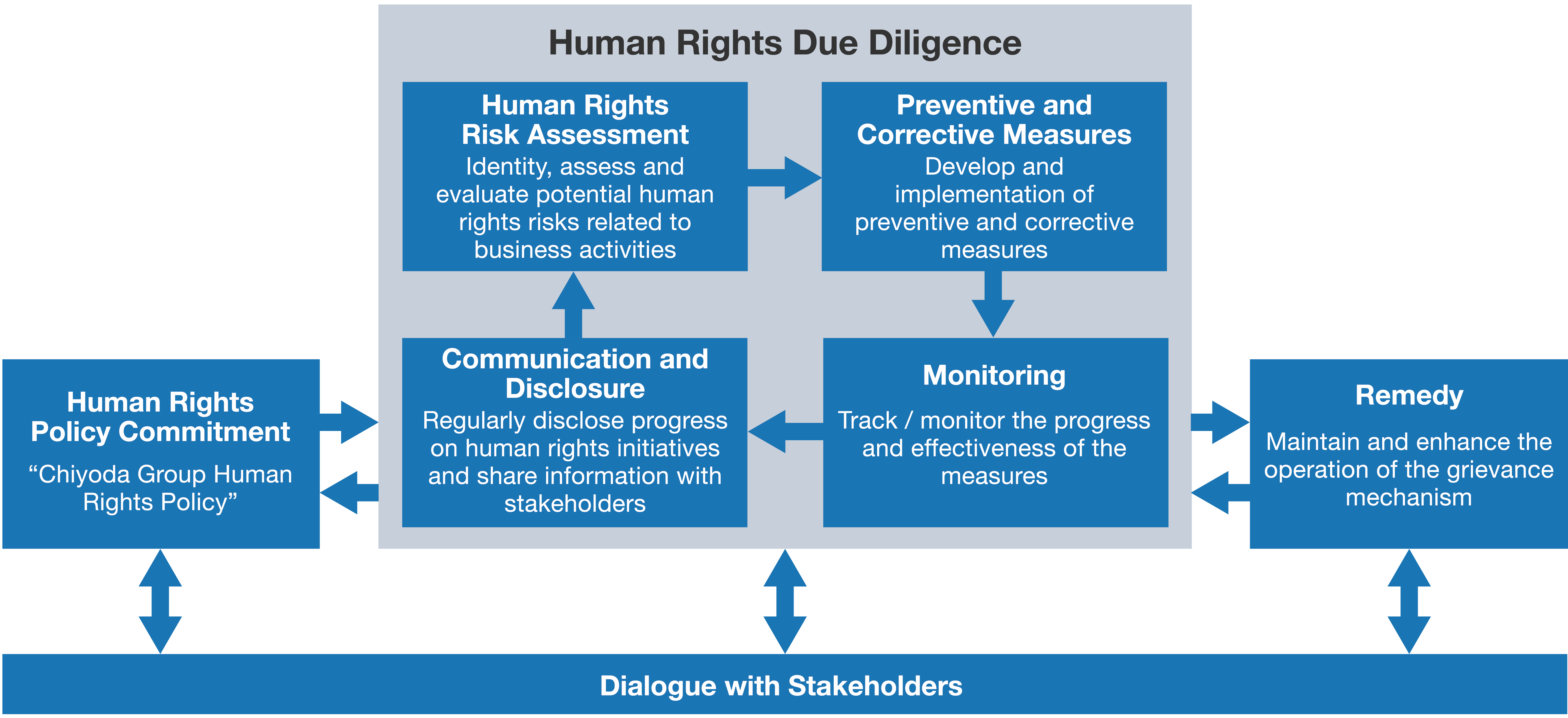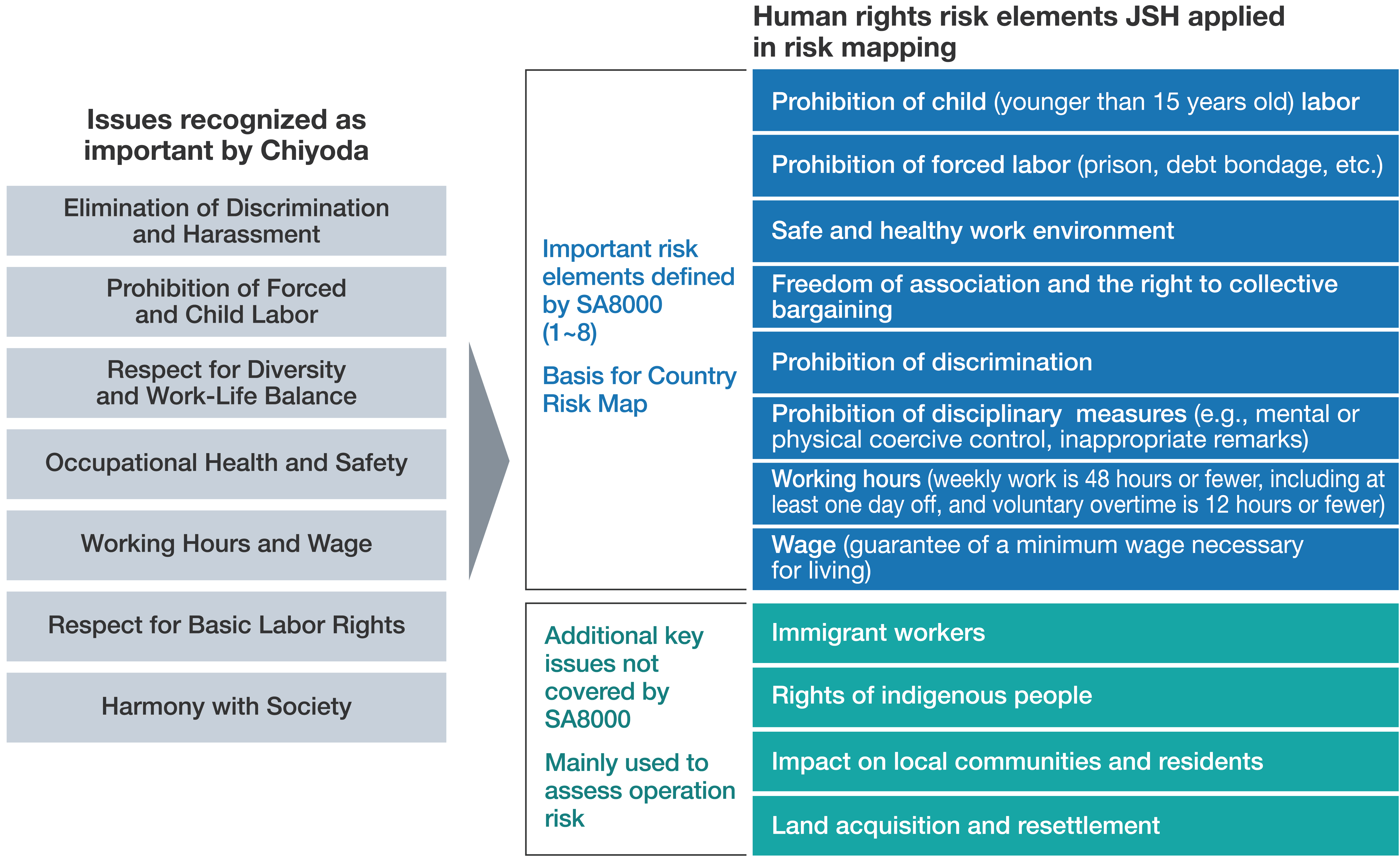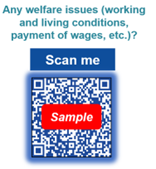Human Rights
Human Rights Policy
The Chiyoda Group (Chiyoda Group) regards respecting human rights as an essential element of a solid business foundation.
We have established Chiyoda Group's Code of Conduct/Conduct Guidelines (Code of Conduct), prescribing the importance of respecting human rights, prevention of human rights violations and respecting international human rights standards.
We also established our 'Human Rights Policy' in September 2018 to clearly articulate our commitment to complying with the Code of Conduct and fulfilling our respect for human rights responsibilities.
The Human Rights Policy was revised in April 2021 to further promote human rights initiatives in response to growing social demands for respecting human rights in corporate activities.
The revision clearly addresses Chiyoda Group's compliance with international laws and norms regarding human rights, such as United Nations 'Guiding Principles on Business and Human Rights', our continuous implementation of Human Rights Due Diligence and prioritization of human rights issues. The Policy applies to all officers and employees of the Chiyoda Group, encompassing all individuals and groups that may be affected by Chiyoda Group's business activities and relationships.
We continue to encourage all business partners, including subcontractors and suppliers and other related parties involved to our business activities, to understand and adhere to the Policy.
The Policy was established and revised by a resolution of the Board of Directors in consultation with J.S. Held (*1).
Operational Framework
The Chiyoda Group pursues human rights distinction through an Operational Framework for Sustainability, with a Sustainability Committee chaired by the Chairman of the Board as the Chief Sustainability Officer (CSO).
Under the Committee, we engage in continuous and intensive discussions from a medium to long-term perspective, covering topics and priority issues determining the outcome of our businessstrategies.
As an advisory organization to the CSO that typically meets twice a year, the Committee established a system to consult with an external sustainability advisor and reports the outcome to the Board of Directors for approval.
In June 2024, a working group was established under the Sustainability Committee to promote the respect of human rights across organizations. In fiscal year 2024, we will examine and discuss human rights due diligence programs in the Chiyoda Group (eg: human rights risk assessment, mitigation and rectification, regular monitoring, information disclosure etc) Procurement Policy and Supplier Code of Conduct Human rights issues include discrimination, harassment, forced labor, child labor, respect for diversity, work-life balance, occupational health and safety, working hours and remuneration. Targets should therefore cover all business enterprise activities, including those with external business partners, such as supply chains. Respect for human rights is managed by responsible divisions/departments/sections (ie: Sustainability Section, Compliance Section, HR Section, SQEI Section, Procurement & Construction Division) in cooperation with other divisions/departments/sections and domestic and overseas Chiyoda Group companies.
Human Rights Due Diligence
The Chiyoda Group has established a mechanism for human rights due diligence in accordance with the processes detailed in the United Nations Guiding Principles on Business and Human Rights, while holding dialogue with stakeholders and cooperating with external consultants. Human rights due diligence refers to an ongoing process undertaken by the business enterprise to identify and assess adverse human rights impacts in their supply chain, to implement appropriate measures to address the impacts and to disclose and account for the progress and results of such measures.

Impact Assessment on Human Rights
Identification of Priority issues regarding Human Rights
To prepare its revision of the Human Rights Policy, the Chiyoda Group assessed potential adverse impacts on human rights from our business activities, and identified priority human rights issues(*2).
Reflecting the constantly changing circumstances surrounding human rights and in collaboration with J.S. Held, the Chiyoda Group conducted a review of the business activities of every group company in fiscal year 2022, including business country/region activities, based on the latest information such as reports, white papers and other documentation published by United Nations, government organizations and research institutions from each country.
The review illustrated that no change in human rights priority issues was required.
Risk Assessment and Prioritization of Chiyoda Group's Businesses/Projects
With respect to the identified human rights priority issues and in collaboration with J.S. Held, the Chiyoda Group conducted risk mapping for the countries and business sectors in which it operates. Based on the eight elements of SA8000 (*3), we quantified human rights risk exposure and prepared a heat map to visualize risk levels (high/medium/low). Also based on a set of twelve elements (four newly added to the eight), the Chiyoda Group quantified human rights risk exposure of every business sector and visualized risk areas.

Based on a combination of country-specific risks and operation-specific risks, we identified businesses/projects with elevated human rights risk and those requiring human rights due diligence implementation on a priority basis, considering additional topics such as revenue, investment, number of employees and others.

Periodic Review of Priority Issues regarding Human Rights
A Human Rights Working Group under the Sustainability Committee conducts periodic human rights risk assessments and reviews human rights priority issues to develop an effective system for promoting human rights initiatives, considering the Chiyoda Group's characteristics and business practices.
Endeavors to Prevent and Mitigate Adverse Human Rights Impacts
Human Rights Initiatives through Project Execution
The following endeavors support human rights in the execution of EPC projects as our main business, with particular attention paid to Chiyoda Group stakeholders (including project-related parties), suppliers (including project site workers) and local communities.
The Chiyoda Group operates all over the world and protection and respect for children's rights is essential in a global society. As highlighted in our Human Rights Policy, the Chiyoda Group is committed to eliminating child labor in accordance with the 'Children's Rights and Business Principles'. While observing related local laws and regulations, we also investigate supplier initiatives to prevent child labor.
Migrant and foreign workers are often vulnerable due to language barriers, gender, cross-border and non-regular work, and human rights violations have been reported.
Many migrant and foreign workers are employed on our construction sites and in project supply chains in Japan and overseas, and the Chiyoda Group is committed to eliminating forced labor, as expressed in our Human Rights Policy. We also confirm supplier endeavors to prevent forced labor.
(Examples of Chiyoda Group endeavors to prevent migrant and foreign worker human rights violations on global projects)
- Checking supplier management systems and interviewing suppliers regarding migrant and foreign workers, support systems (including living arrangements), information dissemination etc.
- Providing education and bulletin boards on occupational health and safety in multiple languages and using eye-catching visual images not subject to language barriers
- Providing meal menus sympathetic to worker countries/regions of origin, religion etc.
- Providing facilities considering religious beliefs (eg: mosques, churches etc)
The Chiyoda Group investigates and evaluates supplier endeavors and initiatives for respecting human rights through questionnaires prior to engaging in business with them. Identified concerns are communicated to suppliers and they are encouraged to implement additional mitigating or prevention measures to address shortcomings.
Contractual Terms and Conditions also guarantee supplier, including second and subsequent tier supplier, respect for human rights.
Such endeavors include all projects assessed as having elevated adverse human rights impact risks.(Examples of provisions to ensure respect for human rights)
Prohibition of forced and/or child labor and discrimination and harassment, responsible recruitment, occupational health and safety, wages and remuneration, working hours, anti-bribery, grievance mechanisms etc.
The Chiyoda Group provides supplier occupational health and safety and worker welfare training and we collaborate with customers, regularly convening 'Talk with the Workforce' sessions while conducting worker opinion surveys (including suppliers) to link their opinions and survey results with specific improvement action.
The Chiyoda Group conducts thorough local surveys before commencing work on site to enhance employee safety. Survey results may dictate the requirement for armed security guards under local laws and regulations. Recognizing that the use of armed security guards potentially increases human rights violation risks due to the inappropriate use of weapons, we stringently and comprehensively evaluate security organizations prior to appointment, ensuring appropriate policies and processes for firearm management and personnel training. The Chiyoda Group only appoints security firms that comply with local laws and regulations and support international agreements such as the 'UN Global Compact' and 'Voluntary Principles on Security and Human Rights'.
Confirming Adverse Human Rights Impacts through On-site Audits
The Chiyoda Group executes regular project site audits and conducts interviews with management and employees of project stakeholders (eg: subcontractors and suppliers), including employee living arrangement inspections, to identify shortcomings, implement mitigating action and monitor stakeholder responses.
Respecting Employee Human Rights
Different perspectives strengthen an organization's flexibility and market response dexterity. The Chiyoda Group respects employee diversity and individuality and promotes a corporate culture and working environment where employees are motivated to work proactively, irrespective of gender, nationality, age, religion, sexual orientation etc. Initiatives include establishing a task team to raise and promote human rights awareness, providing prayer rooms and attracting global employees through briefing programs.
The Chiyoda Group drew up the "Action Plan to Promote Women's Advancement" following the enactment of the Act on the Promotion of Women's Active Engagement in Professional Life (Women's Advancement Promotion Law).
<Action Plan to Promote Women's Advancement>
2024-2028 Act for women empowerment
Chiyoda Corporation hereby declares the following action plan to promote the activity of its women employees:We will continue promoting internal reform whereby all next generation employees, including female employees, can play an active role in the future of the Chiyoda Group, accompanying modern changes in society and maximizing the potential of all Chiyoda Group colleagues.
We will continue to promote an environment where female employees can continue to work regardless of circumstances.The Chiyoda Group respects employee diversity and individuality and we established a 'Health Management and Diversity Promotion Office' within the Human Resources Department in April 2022 from a task team that has been continuously working to raise awareness of women's human resource development and advancement since 2014. The Chiyoda Group promotes a corporate culture that respects all employees and encourages a working environment within which all individuals play an active role, regardless of gender, nationality, age, religion, sexual orientation etc. We will continue our initiatives to realize Diversity & Inclusion to create innovation by combining different perspectives and ideas in a culture unafraid of change.
Health and Productivity Management InitiativesOur Code of Conduct details the Chiyoda Group's initiatives to maintain a healthy and safe working environment to ensure the well-being of all employees. We promote Safety, Quality and Environmental management based on our 'Corporate Safety, Quality and Environment (SQE) Policy' and as highlighted as an essential human rights issue in the Human Rights Policy.
Sustainability / Our Initiative to SafetySafety, Quality and Environment (SQE) Policy
We continue implementing initiatives to provide a working environment within which employees can work with peace of mind. Refer to Sustainability > Safety.We hold regular dialogue with a labor union formed by our members (labor-management consultation) to discuss labor conditions and other issues, the results of which are reflected in employment regulation revisions and other measures.
Prevention and Mitigation Measures within the Chiyoda Group
The Chiyoda Group is working to further disseminate its policies, such as the Code of Conduct and the Human Rights Policy, and initiatives to respect human rights among officers and employees, by implementing the following programs in multilingual format.
- The Chiyoda Group Employee Handbook is distributed to employees to ensure they are familiar with human rights policies.
Chiyoda Group Employee Handbook > - Conducting a yearly compliance e-learning program for all officers and employees, including international norms on human rights, Chiyoda Group's Human Rights Policy, respect for human rights, prevention of harassment, anti-bribery and corruption, internal reporting systems and others. Officers and employees also pledge compliance with our Code of Conduct.
- In 2021, we invited an external consultant, Mr. Keisuke Hanyuda (Chief Executive Officer of OWLS Consulting Group, Inc.) to give a lecture on 'Human Rights Issues and Risks in EPC Business'. Mr Hanyuda discussed the growing global demand, and the importance of corporate endeavors, for respecting human rights. Panel discussions with employees also encompass contemplating and addressing human rights issues in the Chiyoda Group.
- We conduct annual seminars on the following human rights issues, striving to deepen the understanding of human rights among Chiyoda Group officers and employees and to prevent and mitigate adverse impacts on human rights:
・Business and Human Rights
・Prevention of Harassment
・Anti-Bribery and Corruption
・Occupational Health and Safety
・Information Security
- We also conduct annual organizational culture surveys for Chiyoda Group officers and employees on observing compliance, using anonymous questionnaires to investigate items such as the presence (or absence) of a work environment that supports compliance observance, raising compliance awareness and the credibility of our consultation/reporting system in promptly identifying compliance concerns in each organization. We continue working to strengthen our organizational culture of observing compliance by extracting strengths and issues, feeding survey results into each organization and linking them to specific improvement actions.
- The Chiyoda Group Employee Handbook is distributed to employees to ensure they are familiar with human rights policies.
External Human Rights Initiatives
The Chiyoda Group signed the United Nations Global Compact in 2012 and expressed our support for its ten principles. We also joined the Global Compact Network Japan (GCNJ), a local network of the UN Global Compact in Japan, to harvest knowledge and information through discussions with other participating companies at the following subcommittee meetings, exchanging information on initiatives and attending lectures by experts, and linking them to Chiyoda Group's initiatives.
- Supply Chain Subcommittee (participated as a member since 2014)
- Anti-Corruption Subcommittee (participated as a member since 2013)
- Human Rights Due Diligence Subcommittee (participated as a member since 2024)
The Chiyoda Group has been an associate member of 'Building Responsibly' (*4) since 2021. We participate in regular meetings and working groups to discuss and exchange opinions with other companies on issues related to human rights, linking them to Chiyoda Group's initiatives.
Building Responsibly
Effectiveness Evaluation
On-site audit
A second-party audit was conducted on a Chiyoda Group overseas project in fiscal year 2023. Based on the contractual obligation to respect human rights, audit standards reflecting SA8000 were established and related documentation was reviewed, interviews convened with management and employees and inspections of worker rest facilities and living arrangements were performed. As a result, suppliers were instructed to implement corrective measures regarding issues related to worker remuneration and further human rights audits are scheduled annually.
Monitoring
The Chiyoda Group also conducts an annual survey of the corporate culture for compliance, and monitors respect for human rights to evaluate the effectiveness of their human rights due diligence for review and improvement.
Remedial and Relief Measures
Establishing a Consultation and Reporting System
- The Chiyoda Group established a compliance consultation and reporting system (anonymously if desired) as a grievance mechanism for officers and employees and business partners.
- A 'harassment in the workplace' hotline with external consultation was also established. If the user seeks a solution, we implement measures as necessary, following confirmation of the user's intention, based on discussions with the consultant.
- The Chiyoda Group also conducts an annual organizational 'climate survey' on observing compliance, enabling officers and employees to confirm their awareness of the compliance consultation/reporting system. We are committed to developing an effective system, recognized by all employees, to enable harassment victims to receive appropriate remedies, in light of the requirements of the UN Guiding Principles on Business and Human Rights.
Introduction of Application for On-site Workers
We continue collaborating with customers and business partners on some overseas projects to introduce an application that allows on-site workers (including second and subsequent tier supplier employees) to report human rights concerns and grievances.
Specifically, when a two-dimensional code is read on a smartphone, a report form is displayed, allowing workers to report concerns and grievances (anonymously if desired). The application supports multiple languages, including the project's local language and the languages of worker country/region points of origin. The application is promoted through posters, handbooks, morning assemblies and other site meetings.

Human Rights Issues Remedial Measures
If human rights issues are identified through human rights due diligence, we implement remedial measures to resolve the situation and provide remedies to victims.
The Compliance Consultation/Reporting System received thirty consultations and grievances regarding human rights (including harassment) in fiscal year 2023. Three cases of human rights violations (including harassment) were identified in Japan, and remedial action was implemented and disciplinary action taken against the perpetrators. No human rights issues such as forced and/or child labor were identified.
Dialogue with Stakeholders
The Chiyoda Group engages in dialogue with all stakeholders, sharing information to ensure respect for human rights in all business activities. We continue dialogue with labor unions, on-site workers (including supplier workers in the 'Talk with the Workforce' initiative), participation in 'Building Responsibly' and collaborating with external consultants in the field of 'Business and Human Rights'.
- A global consulting company with over 100 offices worldwide and over 1,500 consultants with government organization, regulatory agency, journalism, consulting and other experience, providing comprehensive business intelligence and solutions for business risks. J.S. Held provides global environmental, social and governance (ESG) advisory services, including independent recommendations, risk research, business intelligence, quantitative due diligence, corporate research and human rights due diligence, to global companies, government organizations, financial institutions, leading law firms, regulatory agencies and others.
- 1. Elimination of Discrimination and Harassment
2. Prohibition of Forced Labor and Child Labor
3. Respect for Diversity and Work-Life Balance
4. Occupation Health and Safety
5. Working Hours and Wage
6. Respect for Basic Labor Rights
7. Harmony with Society - An international standard regarding labor and human rights, issued by the US NGO 'Social Accountability International', providing voluntary employer requirements, including worker rights in the workplace, the working environment and management systems.
- Established in 2017, 'Building Responsibility' is an organization led by companies in the engineering and construction sectors with the aim of promoting respect for human rights and the welfare of workers throughout the industry, to meet stakeholder expectations and legal requirements and maintain and manage a healthy and productive workforce.
